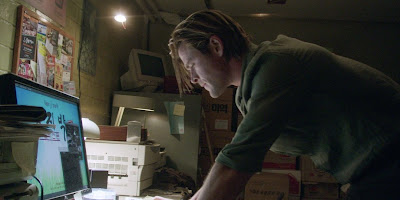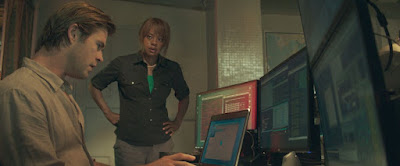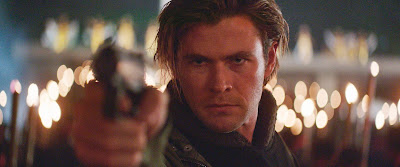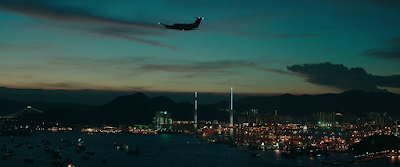Arrow Video: Michael Mann's Misunderstood Black Sheep, Blackhat (2015) – The Director’s Cut Limited Edition - Reviewed
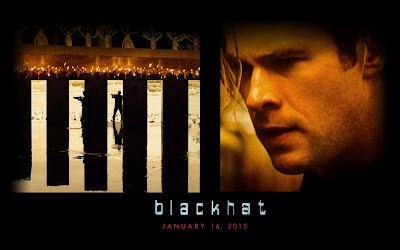 |
| All Images Courtesy: Arrow Video, Universal Pictures |
This context made it extremely exciting when, at the beginning of this year, Arrow Video announced an upcoming special edition UHD and blu-ray release. An Arrow special edition unquestionably elevates the film from a forgotten mid-2010s flop to a film worthy of a second look; an invitation to a reevaluation. However, this release quickly got bogged down in rights issues and drama, resulting in several delays and a suspenseful back-and-forth over which versions of the film could be included, due to the messy state of the director’s cut’s distribution rights (as a contractual FX exclusive, Fox and therefore Disney likely had some contractual claim to the director’s cut, despite the theatrical cut being a straightforward Universal property). When the release was first announced, it was stated that it was only going to include the theatrical cut and the ever-so-slightly-different (as in, a couple different lines of dialogue) international version. Arrow Video's senior producer Michael Mackenzie stated on Facebook in response to questions from disappointed fans that they had tried to get the rights to include the director's cut, but it proved legally impossible. This made for deeply disappointing news: after all, if Arrow was contractually unable to include the much better version of the film that would actually allow people to reevaluate it properly, what was even the point in this release? After being bombarded with questions and complaints to this effect, however, Arrow made the best possible decision: they put the release on hold for most of 2023, so they could take another crack at trying to untangle the home video rights around the director’s cut. After a couple more delays and an announcement that they quickly had to walk back, Arrow came through with what is in my mind the home-media miracle of 2023… they actually managed to secure the rights to release the director’s cut of Blackhat on physical media for the first time ever, on a limited-edition basis. With that announcement, this limited edition instantly went from “what’s even the point?” to one of the essential must-buy blu-ray/UHD sets of the year. I cannot overstate how ecstatic I am that Arrow actually pulled it off, and that it was legally possible to do so after all.
So after months of delay, let’s take a look at the much-discussed but rarely legally available director’s cut of Blackhat, and Arrow’s hard-fought limited edition package.
THE FILM:
The far superior director’s cut of Blackhat begins when an elite "blackhat" hacker launches a cyberattack on the Chicago Mercantile Exchange, artificially driving up the price of soy futures and throwing the global economy into chaos. Chinese cybersecurity agent Chen Dawai (Leehom Wang, Lust, Caution), FBI Agent Carol Barrett (Viola Davis), and Chen's network engineer sister Lien (Tang Wei, Decision to Leave) team up to try and identify the hacker, with the clock ticking before the next attack which they are all sure must be coming. But in order to investigate such a sophisticated cybercrime under a ticking clock, they need the expertise of a hacker of their own: MIT genius turned master cyber-thief Nick Hathaway (Chris Hemsworth), who is offered a commutation of his lengthy prison sentence if he can lead them to the blackhat. The investigation takes the team on a chase around the world as they try to catch up with the hacker and his network of criminals, but the blackhat is also hunting them, both in cyberspace and the physical world, and has no qualms about killing those in his way. The film is a hybrid of a more conventional globetrotting action-thriller, and a more intellectual and high-concept techno-thriller about the dissonance between the fractured nature of countries, agencies, economies, and governments, and the interconnected nature of the internet and the world of data. It explores the idea that hackers who exist in that borderless world of data operate in a way that government bodies, agencies, and even conventional understandings of how the world works are not prepared to deal with, as geographical and political barriers become meaningless and artificial. As both the US and Chinese governments struggle to pursue their ghost-in-the-machine blackhat villain when bound by the constraints of government liaisons and jurisdictional authority, they learn the hard way the film's tagline: We Are No Longer In Control.
The film absolutely delivers with a handful of intense action setpieces: an in-your-face, bloody bar brawl and an extended, bleakly violent cat-and-mouse gunfight in the storm sewers of Hong Kong are as strong of action scenes as any that Mann has directed, and a few of its sudden outbursts of violence are genuinely shocking. But it uses moments like these sparingly, and in general it is more high-concept thriller and less action. Blackhat has no interest in being a Bourne or Mission: Impossible movie, and Universal set itself up for failure by marketing it as such. Most of its thrills are of a more intellectual variety, as Chris Hemsworth's hacker tries to navigate the labyrinth of data to get one step ahead of the blackhat, and the characters are caught up in a maze of clues and dead ends, trying to determine what the cybercriminal is up to, and what his next move is. This involves a lot of characters looking through reasonably-realistically-
Which brings us to the major differences between the theatrical and director’s cuts, which mean that most people have never seen a version of the film that fully realizes those concepts as Mann originally intended. On paper the theatrical and director's cuts might theoretically sound not all that different, since their runtimes only differ by three minutes and the director's cut doesn't actually have that much in the way of extra scenes. But the difference cannot be overstated, and it's all in the structure. The theatrical cut got a massive structural overhaul very late in post-production, with the events of the plot getting radically shifted around, seemingly in an effort to make the film more of a conventional action-thriller that might be more marketable. One can only guess that the studio was afraid that American audiences might not go for a thriller that is mostly about abstract financial crimes and tracing the flow of data, and they wanted it to literally start with a bang to give it more of a "let's stop the terrorists" emphasis. Mann accepted the blame for the recut of the theatrical version, but it feels safe to assume that he second-guessed himself and agreed to those bad creative decisions due to those external pressures. You might have noticed that I started my plot description with "in the director’s cut..." That's because the director's cut literally has a different plot for the first half of the film.
The director's cut (which is how the film was written and shot, it is worth noting) opens with the hack of the Chicago Mercantile Exchange, and a lengthy sequence showing how the hackers' quadrupling the price of soy futures throws the entire global economy into disarray; it's a huge deal which gets a lot of emphasis. That is what the US and Chinese agents are investigating, and what Hathaway is released from prison to get to the bottom of, and it is treated as enough of a chaos-inducing threat that the stakes are already high. A second attack comes much, much later, as the result of a slow build of tension about what the blackhat hacker is up to next; it's a dramatic raising of the stakes, and a shocking burst of violence that totally pulls the rug out from under our main characters, and fundamentally changes what kind of investigation they are doing and what kind of villain they think they are up against. The theatrical cut, on the other hand, moves this second attack to the beginning of the film, making it the inciting incident of the plot, and then having the hack of the mercantile exchange happen immediately after, as almost an “oh, by the way.”
Moving the second attack to the beginning, and having both big hacks happen at the same time, was a disastrously bad idea. It absolutely breaks the structure of the first half of the theatrical cut, leaving the movie without a major secondary event to build suspense towards or foreshadow. It starts the movie out at maximum intensity, yes, but it gives the movie nowhere to go in terms of further upping the intensity, and minimal stakes to raise during that first half, because if the villain is willing to do what he does in literally the film's first 30 seconds, then we know from the opening scene that all bets are off. And since this change was made after the whole film was shot, and they didn't do any significant reshoots to accommodate the plot reshuffle (just awkwardly looped a few lines), there are a whole bunch of scenes that just feel very off in the theatrical cut: the actors are playing the scenes as though they are talking about a financial crime based around the hacking of soy futures, but in the recut context they are talking about a deadly grand-scale terrorist attack, and as a result they sound awfully casual about it. The chronology of the theatrical cut also gets rather messy and choppy, as scenes from the middle of the movie were literally chopped out and slapped onto the front, and things feel a bit scattered until the movie catches back up with where they used to be.
The theatrical cut eventually finds its footing once it catches up to the midpoint where its opening scenes were pulled from, but that first half is rough; not without value (individual scenes are still very good), but the re-edit is about as close to ruinous as you can get, and it is no surprise that most viewers did not find it worth the journey. The awkwardness of the re-edit is obvious enough that even if you haven't seen or read about the director's cut, you would know that something is off about the stilted flow of the film; it feels like a deeply troubled movie. This is quite the opposite of the director's cut, which moves with a sure hand and a tight sense of control - as all great Michael Mann thrillers do - through its labyrinthine plot. There is absolutely no question: there is only one version of Blackhat that anyone should ever watch, and it is the director’s cut. Often I see value in watching and comparing multiple versions of a film, but in this case I say don’t bother: now that Arrow’s special edition is at last widely releasing the director’s cut into the world, there is no reason for anyone to ever watch the theatrical version ever again. This is one of the most stark examples there is of a genuinely great film being ruined by a heavily-altered theatrical cut. It isn’t a film for everyone – it is so high-concept, idea-driven, and pretty niche that maybe no version would have ever made back its mammoth budget in theaters – but for the people who are likely to get into it, the director’s cut is the version that is going to win them over.
Even leaving all that talk of the two cuts aside, Blackhat has a lot of strong points which make it a captivating journey through a high-tech nightmare in either version, if you can get on its wavelength. The cast is excellent, for starters. The script is all about the ideas and the cat-and-mouse mystery, and character development is frankly a much lower priority; the dialogue is very economical, and the characters are fairly minimalistic by design (it would not be an unfair criticism to call them underwritten, though I think that's a deliberate choice). Chris Hemsworth, Tang Wei, Leehom Wang, and Viola Davis bring depth and humanity to all of them, however, fleshing them out with strong performances well beyond what is on the page. Michael Mann tends to make movies that are mostly populated by stoic men, and he isn't exactly known for having a lot of great women characters, but Wei and Davis especially are excellent here, making Lien and Agent Barrett very strong and memorable female leads. Unfortunately Wei gets stuck with a very underbaked, shoehorned-in romantic subplot with Hemsworth, which comes out of nowhere and has almost no development beyond the two actors generally having chemistry. But she still does a standout job in her first English-language performance, and gets to shine when Lien is in her element as a computer expert. Davis, on the other hand, steals every scene she is in, bringing her signature intense gravitas and sense of authority. She and Hemsworth both manage to really sell as thriller material scenes that largely involve combing through data and code talking about the real-world implications of online actions; not an easy task.
The film is also visually stunning - something that goes a long way towards carrying the weaker theatrical cut as a moody and hypnotic aesthetic experience. As with much of Collateral, Blackhat is shot on digital (although not the 30fps consumer-grade look that Miami Vice experimented with), giving it a hyperreal, gritty handheld look, with the small and nimble digital cameras getting right up into the action scenes. But since the movie uses its action sparingly, most of the film is shot in hypnotic, high-contrast compositions of cities at night, using the contrast of neon lights popping out against a black sky in similar ways as Manhunter, Thief, and Heat. The Hong Kong sequences use the city's skyline and crowded, neon-lit streets in visually-stunning ways reminiscent of John Woo's The Killer and Hard Boiled. The film's moody electronic score - co-written by Atticus Ross and quite reminiscent of his scores with Trent Reznor - suits these nocturnal images perfectly, and helps to make it a very satisfying mood-piece.
These qualities absolutely make Blackhat worthy of appreciation in any version, and especially in its director’s cut, a much, much better film than its maligned critical reputation and notorious flop from theaters would suggest. It truly does deserve the second chance that Arrow calls for with this release, and I hope that people reassess the film and realize how good it is, once they can see it in Mann’s original version. The director's cut, with the original structure of the story as written and shot, is a dramatically better, more effective movie; there is no contest. Personally, I would put the director's cut at an 8 out of 10 - an excellent film, if not quite a top-tier Michael Mann like Heat or Collateral or Manhunter - while the theatrical cut with its choppy and disjointed first half I would place at a 6 out of 10. It really is that big of a difference - I can think of few films that were hurt quite so badly in post-production, outside of notorious cases like Exorcist III or Mimic where the studio also did equally-ill-advised reshoots. Arrow has truly worked a miracle in navigating the complicated rights issues involved in including the director’s cut on this set, and I cannot recommend enough that people give it a chance, and see this misunderstood black sheep of Mann’s filmography as it should have always been seen.
THE DISC:
As for Arrow's release itself – in addition to debuting the director’s cut on physical media for the first time, how does their special edition measure up? As far as I’m concerned, the inclusion of the director’s cut is all that this release needs to make it a must-buy, but fortunately the rest of the package is excellent as well! Unfortunately due to the odd way in which this release came together, they were only able to do a new 4k restoration of the theatrical cut – the director’s cut uses Mann’s existing 1080p master which he prepared for its FX release – but that restoration is gorgeous. The movie was shot on digital in 2k, so obviously this isn't a case where we are talking about a new scan, and you won't notice a big upgrade in terms of detail and clarity. But they did some impressive work with the film's color, which shows on the blu-ray version, and is even richer in HDR on the UHD. The colors and contrast look absolutely stunning, at least a bit more so than they previously did, especially in the night scenes (which is a substantial part of the movie), which really pop. With that said, though, the director’s cut already looks very good to begin with, and is certainly not lacking because it does not get these subtle but notable enhancements. It’s a bummer that only the theatrical cut got the new 4k restoration, but in this case this is not a dealbreaker: it just means that by default most people will almost certainly want to watch the director’s cut in 1080p, as it is a far, far better version of the movie, and the UHD restoration of the theatrical cut is just for serious fans of the film who want to see it look its absolute best visually, regardless of it being the weaker version. The 4k-restored disc also boasts two versions of the theatrical cut, but honestly the difference between them is negligible. The international theatrical version cuts about 30 seconds of Viola Davis explaining the Texas-prison-gang background of one of the goons - presumably because the dialogue would not have made much sense outside of America (or at least that's the only reason I can guess - it's a really odd tiny cut). That's literally it - they're the same otherwise. It's cool that the folks at Arrow are such completists that they would include both, but it truly barely matters. In the end, the 1080p director’s cut disc is the main one to watch, and the 4k restoration of the theatrical cut has limited use as an aesthetic experience. Personally I’d recommend saving your money and just buying the blu-ray version and not the UHD/blu combo set, as you’ll almost always want to reach of the blu-ray of the director’s cut anyway.
It should be noted that they could only get the rights to include the director’s cut on this initial limited edition: whenever this version sells out and they repress a standard edition of Blackhat, it will be theatrical-cut-only, so if you are remotedly interested in the film, buy this version. Without the director’s cut, there will pretty much be no point in owning the eventual standard release.
The extras are also solid, considering that the film is such a commercial black sheep that presumably it would have been a tough sell to get Hemsworth or Davis or Wei back in a studio to talk about the experience. Considering how aesthetically bold Blackhat is, the crew members they were able to get for new interviews are invaluable. There is an 18-minute interview with cinematographer Stuart Dryburgh which is extremely interesting for anyone who cares about that aspect of a production. He gets very technical about how he shot the film on the then-new Arri Alexa cameras, and why that particular camera was so crucial to the film's heightened-reality look. He also imparts some really interesting details like how the extremely kinetic Koreatown brawl was shot with several Canon 5D and 7Ds to be as nimble as possible, and how the look of the Hong Kong exteriors were inspired by Wong Kar Wai. It's a really good and very enlightening behind-the-scenes chat if you like getting really granular about a production, and especially if you work with cameras, which I do. The new extras then continue with a half-hour discussion with production designer Guy Hendrix Dyas, which likewise goes very in-depth about the unique challenges of creating an extremely grounded and realistic world, and meshing his sets with location shooting. It gives a lot of cool details of how certain shots and sequences were done, and is a fascinating look at Michael Mann's exacting creative process: hearing details like how Mann and Dyas would observe a location for a full day from sunrise to sunset to see how the movement of the sun affected the location and to determine what time of day they should shoot those scenes. If you're a Michael Mann fan, both of these interviews are fascinating whether you like Blackhat or not, and just further add to this edition being a must-buy. The new extras are rounded out by an audio commentary on the slightly shorter international theatrical cut by film critics Bryan Reesman and Max Evry. The commentary starts not-great, with one of the commentators introducing themselves by blasting Mann's circuit-board visuals as boring and old-hat in a way that comes off as smugly superior, and the whole thing has very much the cadence of a podcast, with friends riffing about a movie that one of them seems to love and the other seems to be pretty flippant about. They do, however, then go on to provide some very interesting context about the production of the film, and the real-life hacking incidents which inspired it. The whole commentary veers back and forth between those two tones, with one guy giving really good, well-researched information, and the other guy snarking about plot points he thinks are dumb, and how Chris Hemsworth and Tang Wei are too hot be believable computer experts, so it's a mixed bag to say the least, and I would only really recommend it to die-hard fans. The extras are rounded out by the trio of behind-the-scenes features from the original blu-ray, featuring Michael Mann and the cast and crew on location.
IN CONCLUSION:
After much delay and behind-the-scenes drama, Arrow Video has really come through, and at last given Blackhat the superlative, reappraisal-worthy special edition that it has deserved ever since its director’s cut first debuted. Back when it looked like rights issues would prevent the inclusion of the director’s cut on this release, the initial review disc I received back in April was a bitter pill to swallow: a technically spectacular disc with great extras, trying and failing to make up for the unavoidable disappointment of the truly great version of the film not being included. Their seven-month delay to untangle the rights and include the director’s cut was absolutely worth it: by pulling off this once-seemingly-impossible task, they have upgraded their limited edition from a disappointing probably-skip to one of the essential must-buy blu-rays of the holiday season. If you previously saw and disliked the theatrical cut of Blackhat, give it another chance in its director’s cut: it is a drastically better, very different movie that is absolutely worthy of being canonized among Michael Mann’s great thrillers. And if you have never seen the film before, do not bother with the mess of a theatrical cut, and just enjoy this opportunity to see the film for the first time in the way that it should have always been seen.
While the director’s cut only being on blu-ray and not UHD may be a disappointment, I really don’t think it’s a huge deal: it still looks great anyway, and since the film is being upscaled from 2k for the UHD, what you are losing is merely a subtle upgrade, and not a night and day difference. Either way this is a technically gorgeous presentation, bolstered by great extras, and an outstanding package for a long-neglected film. If you’re a fan of Blackhat, this is a must-buy. If you’re a fan of Michael Mann, this is a must-buy. If you’re curious about the film, this definitely the time to check it out. And since the director’s cut is only going to be on the limited edition and not the eventual standard release, I do not recommend sleeping on this one. Arrow has pulled of a cinephile’s dream release with this one.
- Christopher S. Jordan
Be a whitehat and share this review!

